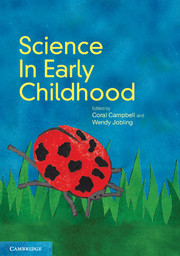Book contents
- Frontmatter
- Contents
- Contributors
- INTRODUCTION
- CHAPTER 1 SCIENCE IN THE NATIONAL EARLY YEARS LEARNING FRAMEWORK
- CHAPTER 2 LEARNING THEORIES RELATED TO EARLY CHILDHOOD SCIENCE EDUCATION
- CHAPTER 3 USING PLAY PEDAGOGY IN THE EARLY YEARS
- CHAPTER 4 TEACHING APPROACHES
- CHAPTER 5 DEVELOPING PEDAGOGICAL PRACTICES FOR SCIENCE TEACHING AND LEARNING WITH 3 AND 4-YEAR-OLD CHILDREN
- CHAPTER 6 EFFECTIVE SCIENCE LEARNING ENVIRONMENTS
- CHAPTER 7 LEARNING SCIENCE IN INFORMAL CONTEXTS: THE HOME AND COMMUNITY
- CHAPTER 8 ENVIRONMENTAL EDUCATION FOR SUSTAINABILITY AND ITS PLACE WITHIN SCIENCE
- CHAPTER 9 CATERING FOR CHILDREN'S DIFFERING NEEDS IN EARLY CHILDHOOD SCIENCE EDUCATION
- CHAPTER 10 PLANNING FOR SCIENCE
- CHAPTER 11 OBSERVING, ASSESSING AND DOCUMENTING LEARNING IN SCIENCE
- CHAPTER 12 PROFESSIONAL LEARNING – REFLECTIVE PRACTICE IN SCIENCE EDUCATION
- Additional resources
- Appendix
- Glossary
- Index
CHAPTER 2 - LEARNING THEORIES RELATED TO EARLY CHILDHOOD SCIENCE EDUCATION
- Frontmatter
- Contents
- Contributors
- INTRODUCTION
- CHAPTER 1 SCIENCE IN THE NATIONAL EARLY YEARS LEARNING FRAMEWORK
- CHAPTER 2 LEARNING THEORIES RELATED TO EARLY CHILDHOOD SCIENCE EDUCATION
- CHAPTER 3 USING PLAY PEDAGOGY IN THE EARLY YEARS
- CHAPTER 4 TEACHING APPROACHES
- CHAPTER 5 DEVELOPING PEDAGOGICAL PRACTICES FOR SCIENCE TEACHING AND LEARNING WITH 3 AND 4-YEAR-OLD CHILDREN
- CHAPTER 6 EFFECTIVE SCIENCE LEARNING ENVIRONMENTS
- CHAPTER 7 LEARNING SCIENCE IN INFORMAL CONTEXTS: THE HOME AND COMMUNITY
- CHAPTER 8 ENVIRONMENTAL EDUCATION FOR SUSTAINABILITY AND ITS PLACE WITHIN SCIENCE
- CHAPTER 9 CATERING FOR CHILDREN'S DIFFERING NEEDS IN EARLY CHILDHOOD SCIENCE EDUCATION
- CHAPTER 10 PLANNING FOR SCIENCE
- CHAPTER 11 OBSERVING, ASSESSING AND DOCUMENTING LEARNING IN SCIENCE
- CHAPTER 12 PROFESSIONAL LEARNING – REFLECTIVE PRACTICE IN SCIENCE EDUCATION
- Additional resources
- Appendix
- Glossary
- Index
Summary
Objectives
At the end of this chapter, you will:
recognise the factors underpinning children's cognitive development
describe a range of learning theories that relate specifically to how children develop science understandings.
The term ‘cognitive development’ is used to describe a child's development of cognition or conceptual knowledge and understanding. When considering cognitive development, Johnston and Nahmad-Williams (2009) indicate 10 aspects of importance:
memory
abstraction – the ability to form general concepts
logic – being able to reason
problem-solving
intelligence – a measure of thinking ability
reasoning – providing evidence for a belief
thinking – using the mind
knowledge – belief about something that is known
understanding – to comprehend something
metacognition – to understand one's own thought processes (adapted from Johnston & Nahmad-Williams, 2009).
Overview
When we discuss cognitive development we are really talking about the development of one or more of the above aspects. Sometimes the development can occur singly, but often these aspects are inter-related. Some aspects occur before others and some take a longer period to develop.
Children attempt to make sense of and to understand the various situations and phenomena with which they interact. This is science in its purest and simplest sense – gaining an understanding of the world around them. Children's understanding is based on the range of experiences and interactions they have and the cognitive development of ‘concepts’ that help to explain the phenomena, to them at least.
- Type
- Chapter
- Information
- Science in Early Childhood , pp. 24 - 37Publisher: Cambridge University PressPrint publication year: 2012



